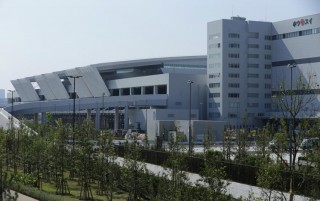Loading
Search
▼ New Tokyo Fish Market to Open on Oct 11, 2018
- Category:Spot
TOKYO -Tokyo's famed Tsukiji fish market will move to a new site on Oct 11, the capital's governor said Wednesday, ending years of delays marked by scandals and emotional divisions among fishmongers.
Yuriko Koike's decision should also clear the way for a key transport hub for the 2020 Olympic Games to be situated on the market's site in eastern Tokyo.
"We believe the schedule will give us enough time to prepare for a smooth relocation," she told reporters.
The market, a popular tourist attraction in an area packed with restaurants and shops, will move to Toyosu, a former gas plant a bit further east.
Koike's decision draws to a close a charged debate over what to do with the dilapidated but beloved Tsukiji market that handles 480 kinds of seafood worth $14 million daily -- as well as 270 types of fruits and vegetables.
The market is best known for its pre-dawn daily auctions of tuna, caught from all corners of the ocean, for use by everyone from top Michelin-star sushi chefs to ordinary grocery stores.
The market opened in 1935 and has fed Japan's hunger for fresh seafood ever since.
But in recent years the antiquated facility has prompted its users, such as seafood wholesalers, to voice concerns about its earthquake resistance, sanitation and fire safety, as well as the structure's use of asbestos and its crumbling walls.
They have also discussed the need for upgraded technology, such as better refrigeration systems.
However, the move, originally slated for late 2016, also faced loud opposition from various businesses that operate at or around the market, an extremely popular attraction located conveniently within walking distance from the Ginza shopping district.
Many businesses were emotionally attached to the Tsukiji brand as well as the location, which also had its own problems with soil contamination as it used to house a dry cleaning plant before the market was built.
Koike put the relocation plan on hold shortly after being elected Tokyo's first female governor last year.
She then found a series of problems with the new site in Toyosu, including soil and groundwater contamination as well as the discovery that contractors had inexplicably failed to fill in a basement at the new site with clean soil as a buffer against underground pollution.
The local government has paid hundreds of millions of dollars to clean up the new facility.
Tsukiji's wholesalers have voiced frustration over the delay, arguing that postponing the move was costing them millions of dollars a month.
The decision will also officially make the upcoming new year tuna auctions the last at the beloved market.
In January, Kiyoshi Kimura, Japan's self-styled "Tuna King," paid more than $600,000 for a 212-kilogram bluefin tuna at the first auction of the new year.
© 2017 AFP
Yuriko Koike's decision should also clear the way for a key transport hub for the 2020 Olympic Games to be situated on the market's site in eastern Tokyo.
"We believe the schedule will give us enough time to prepare for a smooth relocation," she told reporters.
The market, a popular tourist attraction in an area packed with restaurants and shops, will move to Toyosu, a former gas plant a bit further east.
Koike's decision draws to a close a charged debate over what to do with the dilapidated but beloved Tsukiji market that handles 480 kinds of seafood worth $14 million daily -- as well as 270 types of fruits and vegetables.
The market is best known for its pre-dawn daily auctions of tuna, caught from all corners of the ocean, for use by everyone from top Michelin-star sushi chefs to ordinary grocery stores.
The market opened in 1935 and has fed Japan's hunger for fresh seafood ever since.
But in recent years the antiquated facility has prompted its users, such as seafood wholesalers, to voice concerns about its earthquake resistance, sanitation and fire safety, as well as the structure's use of asbestos and its crumbling walls.
They have also discussed the need for upgraded technology, such as better refrigeration systems.
However, the move, originally slated for late 2016, also faced loud opposition from various businesses that operate at or around the market, an extremely popular attraction located conveniently within walking distance from the Ginza shopping district.
Many businesses were emotionally attached to the Tsukiji brand as well as the location, which also had its own problems with soil contamination as it used to house a dry cleaning plant before the market was built.
Koike put the relocation plan on hold shortly after being elected Tokyo's first female governor last year.
She then found a series of problems with the new site in Toyosu, including soil and groundwater contamination as well as the discovery that contractors had inexplicably failed to fill in a basement at the new site with clean soil as a buffer against underground pollution.
The local government has paid hundreds of millions of dollars to clean up the new facility.
Tsukiji's wholesalers have voiced frustration over the delay, arguing that postponing the move was costing them millions of dollars a month.
The decision will also officially make the upcoming new year tuna auctions the last at the beloved market.
In January, Kiyoshi Kimura, Japan's self-styled "Tuna King," paid more than $600,000 for a 212-kilogram bluefin tuna at the first auction of the new year.
© 2017 AFP
- December 21, 2017
- Comment (0)
- Trackback(0)


